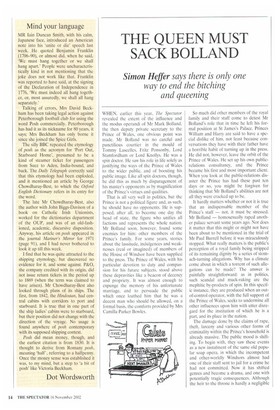Mind your language
MR lain Duncan Smith, with his calm, Japanese face, introduced an American note into his 'unite or die' speech last week. He quoted Benjamin Franklin (1706-90), or almost did, when he said, 'We must hang together or we shall hang apart.' People were uncharacteristically kind in not mentioning that the joke does not work like that. Franklin was reported to have said, at the signing of the Declaration of Independence in 1776, 'We must indeed all hang together, or, most assuredly, we shall all hang separately.'
Talking of errors, Mrs David Beckham has been taking legal action against Peterborough football club for using the word Posh commercially. Peterborough has had it as its nickname for 80 years, it says; Mrs Beckham has only borne it since she joined the Spice Girls.
The silly BBC repeated the etymology of posh as the acronym for 'Port Out, Starboard Home', presumed to be a kind of steamer ticket for passengers from Suez to Aden, India-bound, and back. The Daily Telegraph correctly said that this etymology had been exploded, and it mentioned an article by George Chowdharay-Best, to which the Oxford English Dictionary refers in its entry for the word.
The late Mr Chowdharay-Best, also the author with John Biggs-Davison of a book on Catholic Irish Unionists, worked for the dictionaries department of the OUP, and was of an old-fashioned, academic, discursive disposition. Anyway, his article on posh appeared in the journal Mariner's Mirror for 1971 (page 91). and I had never bothered to look it up till this week.
I find that he was quite attracted to the shipping etymology, but discovered no evidence for it, and some against. P&O, the company credited with its origin, did not issue return tickets in the period up to 1869 (when the term was claimed to have arisen). Mr Chowdharay-Best also looked through plans of its ships. The first, from 1842, the Hindostan, had central cabins with corridors to port and starboard. It is true that in one part of the ship ladies' cabins were to starboard, but their position did not change with the direction of the voyage. No usage is found anywhere of posh contemporary with its supposed shipping context.
Posh did mean money, though, and the earliest citation is from 1830. It is thought to derive from Romany posh, meaning 'half', referring to a halfpenny. Once the money sense was established it was, to my mind, but a step to 'a bit of posh' like Victoria Beckham.
Dot Wordsworth


























































































 Previous page
Previous page